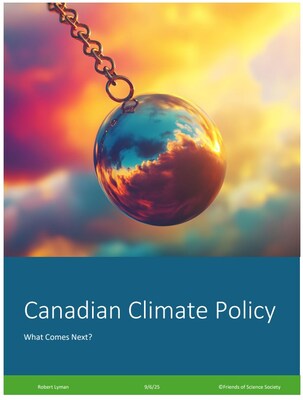A new report by the Friends of Science Society casts doubt on Canada’s climate commitments, claiming the goals set out under the Paris Agreement lack a clear and transparent roadmap. Retired energy economist Robert Lyman warns that conflating present-day wildfires with climate change oversimplifies the issue, urging policymakers to rethink their approach.
Unrealistic Canadian Climate Policy Bogs Down Economy says Friends of Science Society Report

Key Takeaways:
- The Friends of Science Society released a report titled “Canadian Climate Policy – What Comes Next?”
- Authored by Robert Lyman, the report argues that Canada’s greenhouse gas targets are unrealistic.
- The report criticizes the linking of current wildfires to climate change, disputing this association based on IPCC findings.
- Lyman calls for greater transparency or abandonment of targets altogether.
- Newly minted Prime Minister Mark Carney announced five “nation-building” projects that may boost the economy but are not explicitly labeled as climate initiatives.
Canada’s Emission Targets Under Fire
A new report, “Canadian Climate Policy – What Comes Next?”, published by the Friends of Science Society, challenges Canada’s sustainability goals set under the Paris Agreement and the country’s 2035 Nationally Determined Contribution (NDC). Authored by retired energy economist Robert Lyman, the report contends that Canada’s greenhouse gas (GHG) reduction targets are not backed by a feasible plan. The Friends of Science Society underscores the importance of demonstrating exactly how such ambitious objectives will be met, warning that ambitious declarations without clear action steps can undermine economic stability.
A Call for Realism
Robert Lyman’s chief argument is that Ottawa’s climate ambitions must be “made more realistic.” He urges policymakers to introduce transparent measures that show how Canada’s newly established targets can be fulfilled—if achieving them is indeed possible. Otherwise, he suggests these targets should be abandoned, arguing that without a coherent path, current policy risks burdening the economy without delivering tangible progress in cutting emissions.
The Wildfire Conflation Debate
The report further critiques what it sees as a trend of linking current wildfires and extreme weather events solely to climate change within government reports. According to the Friends of Science Society, Canada’s reporting conflates these phenomena with human-caused climate change in ways that are not fully supported by the Intergovernmental Panel on Climate Change (IPCC). The report suggests that more precise, evidence-based assessments of natural disasters should inform climate policy rather than assumptions not anchored in IPCC findings.
Prime Minister Carney’s “Nation-Building” Projects
As reported by the CBC on September 11, 2025, newly minted Prime Minister Mark Carney announced five “nation-building” ventures designed to stimulate Canada’s economy. While details on their scope and funding remain limited, the Friends of Science Society’s report questions how these projects fit into—if at all—the country’s overarching climate strategy. Rather than focusing on emission reduction, these initiatives appear aimed at economic growth. Whether they will ultimately help, hinder, or sidestep Canada’s climate commitments remains a pivotal question for policymakers, the public, and critics alike.











